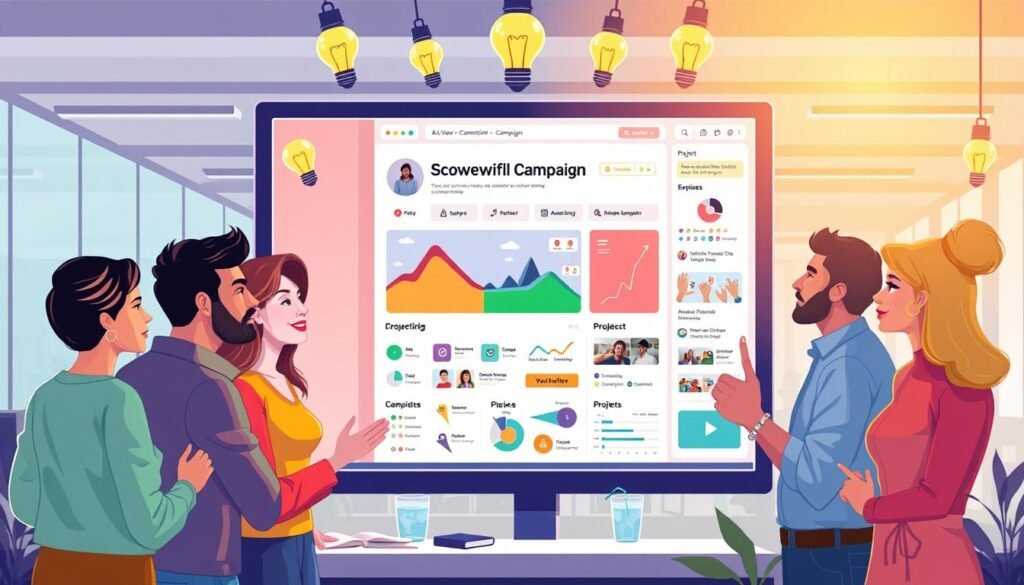Did you know over 600,000 new small businesses start in the United States each year? Getting the money you need to grow can be tough. This guide will show you many funding options to help your business grow.
Key Takeaways
- Know what funding you need, including your current finances and growth goals.
- Look into bank loans and credit, and also alternative options like SBA loans and venture capital.
- Find out about crowdfunding and government grants for extra funding.
- Learn about financing for equipment and using your assets as collateral.
- Make a strong pitch and build good relationships with investors to get the funding you need.
Understanding Your Business Funding Needs
Getting the right financing is key for your business to grow and succeed. Before looking at business loans and financing options, know what your company needs. This means checking your finances, planning for growth, and setting startup capital goals.
Evaluating Current Financial Position
First, look at your business’s money situation. Review your income statements, balance sheets, and cash flow statements. This will show you your income, expenses, assets, and debts. It helps you see where your business is doing well and where it needs work.
Determining Growth Requirements
Then, think about your business’s future. Do you want to grow, hire more people, or buy new equipment? Figure out how much money you need for these plans. Think about market trends, competition, and your long-term goals.
Setting Realistic Funding Goals
Now, set funding goals based on your financial situation and growth plans. Decide how much money you need for now and the future. Look at financing options like bank loans, SBA loans, or other choices.
By carefully looking at your business’s finances, you’ll make better choices about business loans and financing solutions. This will help your company grow and succeed.
“Securing the right financing is crucial for the growth and success of your business. Take the time to understand your financial needs and explore the various funding options available to you.”
Traditional Bank Loans and Credit Options
Traditional bank loans and credit options are solid choices for financing your small business. They offer many benefits but come with their own set of challenges. It’s crucial to know the application process, what you need, and the potential downsides before making a decision.
Bank Business Loans
Bank business loans are a common choice for small businesses. They offer fixed or variable interest rates and can be used for various needs like expansion or equipment purchase. To qualify, you’ll need to provide financial statements, a solid business plan, and collateral.
Business Lines of Credit
A business line of credit lets you access funds as needed, up to a set limit. It’s great for short-term expenses or unexpected opportunities. You only pay interest on what you borrow, making it cost-effective.
When looking at traditional bank loans and credit, consider both sides. They often have good interest rates and the stability of a big bank. But, the application can be tough, needing lots of paperwork and taking longer to get approved.
| Pros of Traditional Bank Loans and Credit | Cons of Traditional Bank Loans and Credit |
|---|---|
|
|
Understanding traditional bank loans and credit can help small business owners make better choices. It’s about finding the right financing for your business’s growth.
Small Business Administration (SBA) Loan Programs
Small business owners have many financing options thanks to the Small Business Administration (SBA). The SBA offers several loan programs to help your business grow. These loans are designed to be more accessible and affordable for businesses of all sizes.
SBA 7(a) Loans
The 7(a) program is a top choice for SBA loans. It offers flexible financing for various business needs. This includes working capital, equipment, real estate, and expansion. With competitive rates, longer terms, and a low down payment, these loans are great for small business funding.
CDC/504 Loans
The CDC/504 loan program is for businesses wanting to buy commercial real estate or equipment. It has a special structure. The SBA’s CDC provides up to 40%, a lender covers 50%, and you contribute 10%. This helps you save money while investing in important assets.
Microloans
The SBA Microloan program offers loans up to $50,000. It’s perfect for small businesses and some not-for-profit childcare centers. These SBA loans are great for startups, minority-owned businesses, or those needing short-term funds for equipment, inventory, or working capital.
Finding the right financing can be tough, but the SBA has many options. Each loan program meets different business needs. By understanding each program’s features and requirements, you can find the best SBA loan for your business.
Alternative Lending Solutions
In today’s fast-changing business world, traditional bank loans might not fit every small business’s needs. Luckily, there are many alternative lending options that offer flexible and new ways to get financing. These options can help your business grow by providing the money it needs.
Online lending platforms are a popular choice. They use technology to make getting a loan faster and easier than banks. They offer different products like short-term business loans, lines of credit, and invoice factoring. This helps meet the varied needs of small businesses.
Peer-to-peer (P2P) lending is another interesting option. It connects borrowers directly with investors, skipping the middleman. This can lead to better rates. P2P platforms often have easier rules and are great for businesses that don’t fit traditional bank criteria.
| Alternative Lending Option | Typical Loan Amounts | Repayment Terms | Estimated Interest Rates |
|---|---|---|---|
| Online Lenders | $5,000 – $500,000 | 3 months – 5 years | 6% – 30% |
| Peer-to-Peer Lending | $2,000 – $40,000 | 1 – 5 years | 6% – 20% |
While alternative lending options have many benefits, it’s key to think about your business’s specific needs and financial situation. Look at the terms and conditions of each option carefully. By exploring different business loans and financing options, you can find the best one for your business’s growth and success.

“Innovative financing solutions can unlock new opportunities for small businesses to thrive and expand.”
Venture Capital and Angel Investors
Securing funding for your small business can be done through venture capital and angel investors. These options are great for businesses looking to grow fast. But, getting venture capital or angel investment needs careful planning and thought.
Preparing Your Pitch
To attract venture capital or angel investors, you need a strong pitch. Research the market, your competitors, and what makes your business special. Write a clear business plan that shows how you’ll grow, your financial outlook, and how much money you need.
Practice your pitch until you can share it confidently and clearly.
Equity Considerations
Investments from venture capital and angel investors usually mean giving up some of your business. Before agreeing, think about the terms and how they affect your control. Understand how your ownership might change and be ready to negotiate good terms for your business’s future.
Building Investor Relationships
It’s important to build good relationships with venture capitalists and angel investors. Go to industry events, network, and show your knowledge and love for your business. Trust and rapport can help you get investment and support as your business grows.
Getting venture capital or angel investment needs a smart plan. With a great pitch, understanding equity, and building strong relationships, you can get the funding to grow your small business.
Small Business Funding Through Crowdfunding Platforms
Crowdfunding has changed the game for small businesses looking for funding. It lets entrepreneurs connect with supporters and investors. This way, they can make their dreams come true.
Platforms like Kickstarter, Indiegogo, and Fundable make it easy for small businesses to share their ideas. They use social media to reach people all over the world. This helps entrepreneurs find backers who want to help their projects succeed.
Types of Crowdfunding
There are different types of crowdfunding, each with its own benefits. Reward-based crowdfunding lets backers get something in return for their money. Equity crowdfunding gives investors a share of the business. Donation-based crowdfunding is for those who want to support a cause. And debt crowdfunding offers loans from a community of lenders.
Crowdfunding Campaign Strategies
- Crafting a compelling and visually engaging campaign page
- Leveraging your existing network and social media to spread the word
- Offering attractive rewards or equity incentives to potential backers
- Maintaining consistent communication and updates throughout the campaign
- Collaborating with influencers or industry experts to boost visibility
By understanding crowdfunding, small businesses can find new ways to fund their projects. With the right plan, crowdfunding can be a game-changer for entrepreneurs.

“Crowdfunding has revolutionized the way small businesses access capital, empowering entrepreneurs to turn their ideas into thriving enterprises.”
Government Grants and Support Programs
As a small business owner, finding grants and government funding can help you grow. There are many options, from federal programs to state and industry-specific ones. These can provide the resources you need.
Federal Grant Opportunities
The Small Business Administration (SBA) offers grants for small businesses. They have the SBIR and STTR grants for research and development. They also have the Microloan program for short-term loans to startups and growing businesses.
State-Specific Programs
States also have grants for local small businesses. For example, California had a COVID-19 Relief Grant Program for small businesses hit by the pandemic. Check what grants are available in your state to find more funding.
Industry-Specific Funding
- The U.S. Department of Agriculture offers grants for rural small businesses and agricultural enterprises.
- The National Institutes of Health provide funding for small businesses in the life sciences and healthcare sectors.
- The Department of Energy has grant programs for small businesses working on clean energy solutions.
To get these grants, you need to know your business’s unique needs. Match your business goals with the focus of these grants. This way, you can get the funding you need to grow.
Getting government grants and support takes research and a good proposal. Understand the application process well. By putting in the effort, you can find valuable resources for your business.
Equipment Financing and Asset-Based Lending
As a small business owner, getting the right equipment is key to growing. There are financing options to help you get what you need without using all your cash. Equipment financing and asset-based lending are great choices to consider.
Equipment financing lets you borrow for new or used machinery and vehicles. It helps you pay over time, keeping your cash flow steady. Asset-based lending uses your assets like real estate or inventory to get a loan. It’s good if you can’t get a traditional business loan.
Both options have benefits like quick approval and flexible terms. They also let you keep ownership of your assets. When looking at these options, think about what your business needs. Compare different lenders and pick the best fit for your goals and budget. Using equipment financing or asset-based lending can help your business grow and succeed.
